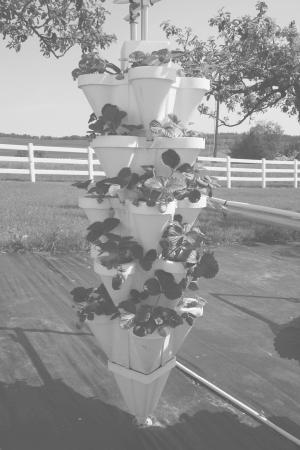Stackable Strawberry Pots Boost U-Pick Business
 ✖  |
Aaron and Sarah Kennel in Monmouth, Oregon say that growing strawberries in vertically-stacked, polystyrene foam pots is a great way to set up a U-pick operation. It makes it easy to pick a lot of berries in a small space and they're even available in wheelchairs and walkers.
The operation grows 15,000 strawberry plants on only 1/4 of an acre - only about 1/8 of the land that would be required for a conventional operation. Water demand is also dramatically cut.
"There's no need to get on your hands and knees or strain your back. Berry pickers can either stand or sit," Kennel explains. "The 5-ft. tall columns of plants swivel around aluminum poles like rotating store racks. There are five tiers per column, and each tier is one piece but provides four individual plant cones. On the ground below, we have industrial strength nursery cloth, to keep it smooth and dry with no weeds, rodents or mud. The fabric also keeps slugs off the plants."
The plants grow in a soil-less growing media and hydroponic "micro-irrigation tubes" supply nutrient-rich water to the roots several times a day. With no soil involved, nothing gets dirty. The elevated tier towers of perforated planters mean that the strawberries are less susceptible to mold and insect problems because of better air flow, and overhead nozzles deliver an organic control solution when necessary.
"To avoid uprooting the plants, which aren't anchored in soil, we supply scissors to snip the berries from the vine," he says. "Picking strawberries this way is much easier than the traditional way."
Kennels say their produce is sweet and flavorful because of the way it's grown. Also, by growing seven different varieties, they're able to extend their productive season from the typical two to three week strawberry growing period to five to six months. The success of some of the varieties they're growing is due to the insulative foam containers keeping the roots warmer than if they were in the ground.
While maintenance and repairs to the hydroponic setup are minimal, the plants become root-bound by the end of the season and must be discarded and replaced each spring.
Contact: FARM SHOW Followup, Aaron and Sarah Kennel, Airlie Hills Family Farm, Monmouth, Oregon (www. airliehillsfarm.com).

Click here to download page story appeared in.
Click here to read entire issue
Stackable Strawberry Pots Boost U-Pick Business 32-3-6 Aaron and Sarah Kennel in Monmouth, Oregon say that growing strawberries in vertically-stacked, polystyrene foam pots is a great way to set up a U-pick operation. It makes it easy to pick a lot of berries in a small space and they're even available in wheelchairs and walkers.
The operation grows 15,000 strawberry plants on only 1/4 of an acre - only about 1/8 of the land that would be required for a conventional operation. Water demand is also dramatically cut.
"There's no need to get on your hands and knees or strain your back. Berry pickers can either stand or sit," Kennel explains. "The 5-ft. tall columns of plants swivel around aluminum poles like rotating store racks. There are five tiers per column, and each tier is one piece but provides four individual plant cones. On the ground below, we have industrial strength nursery cloth, to keep it smooth and dry with no weeds, rodents or mud. The fabric also keeps slugs off the plants."
The plants grow in a soil-less growing media and hydroponic "micro-irrigation tubes" supply nutrient-rich water to the roots several times a day. With no soil involved, nothing gets dirty. The elevated tier towers of perforated planters mean that the strawberries are less susceptible to mold and insect problems because of better air flow, and overhead nozzles deliver an organic control solution when necessary.
"To avoid uprooting the plants, which aren't anchored in soil, we supply scissors to snip the berries from the vine," he says. "Picking strawberries this way is much easier than the traditional way."
Kennels say their produce is sweet and flavorful because of the way it's grown. Also, by growing seven different varieties, they're able to extend their productive season from the typical two to three week strawberry growing period to five to six months. The success of some of the varieties they're growing is due to the insulative foam containers keeping the roots warmer than if they were in the ground.
While maintenance and repairs to the hydroponic setup are minimal, the plants become root-bound by the end of the season and must be discarded and replaced each spring.
Contact: FARM SHOW Followup, Aaron and Sarah Kennel, Airlie Hills Family Farm, Monmouth, Oregon (www. airliehillsfarm.com).
To read the rest of this story, download this issue below or click
here to register with your account number.







